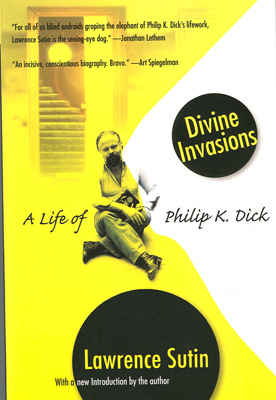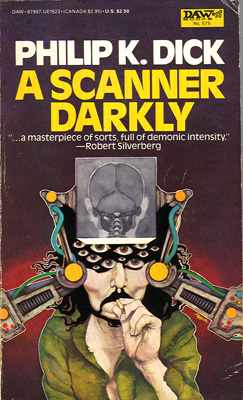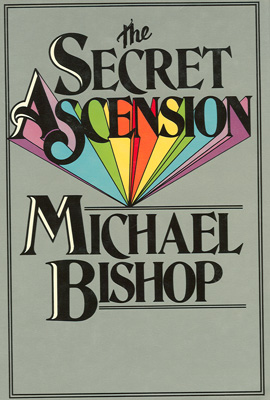I just finished reading a gripping, although somewhat depressing, biography of one of my literary heroes, recently reissued: Divine Invasions: A Life of Philip K. Dick (Carroll and Graf, 1989, 2005 New York), by Lawrence Sutin. A page-turner of a book, almost like a novel.

The depressing aspect has to do with how many character flaws and psychic disabilities Phil had. But the book has some nice quotes from Phil about his writing style. I’ll page-number the quotes according to where they appear in the 2005 edition of Divine Invasions. I’ll start with two quotes about what I’ve come to call transrealism.
“I want to write about the people I love and put them into a fictional world spun out of my own mind, not the world we actually have, because the world we actually have does not meet my standards.” p. 4.
“And I always think, well, the ultimate surrealism … is to take somebody that you knew, whose life-time ambition was to sell the largest television set that the store carried, and put him in a future utopia or dystopia, and pit him against this dystopia, or place him in a position of power.” p. 54.
I think I’m becoming a bit less transreal as the years wear on. As a writer’s craft grows (and his or her friends get older and less interesting), he or she perforce moves beyond simple character-to-friend identifications. It becomes more fragmented, you piece together fake people from shards.

[Out at Wilder Ranch in Cruz yesterday. It's spring in California.]
In my current novel Postsingular I’m experimenting with Phil’s multiple third-person viewpoint technique, where he switches, sometimes on the same page, from seeing through one person’s eyes to another’s. Speaking of The Man in the High Castle, biographer Lawrence Sutin puts it this way, “The third-person voice is used throughout, but in an intimate, hovering matter, with characters shifted quickly into and out of prominence.” In a letter quoted in the bio, Phil says where picked up this technique.
“In the forties I got into novels written around that time by students at the French Department of Tokyo University; these students had studied the French realistic novels (which I, too, had read) and the Japanese students redesigned the slice-of-life structure to produce a compact, more integrated form … When I went to write The Man In The High Castle I asked myself, How would this novel have been written — with what structure — if Japan had won the war? Obviously, using the multiple viewpoint structure of those students…” p. 114.
Note that, if done ineptly, this technique leads to what’s denigratingly called “wandering viewpoint” — a common flaw in the work of tyro writers. But Dick can make it work as does, for that matter, Thomas Pynchon. I’m a little scared of the technique, and usually use a chapter break or a *** section break to separate the switch between active character-views.

Another artistic trick of Phil’s that interests me is that you should fold together two plots into one book to have a really lively novel, a book that’s what I call unpredictable, gnarly, and class four. I read the following injunction of Phil’s years ago, and I often think of it when I’m planning a book. To make a book cook, you want two plots, not one.
“Every novel of mine is at least two novels superimposed. This is the origin, this is why they are full of loose ends, but also, it is impossible to predict the outcome, since there is no linear plot as such. It is two novels into a sort of 3-D novel.” p. 256

Phil was into the notion of having someone’s mind permeate all of reality; he does this in Ubik and in The Three Stigmata of Palmer Eldritch.
“So Runciter and Ubik equals Palmer Eldritch and Chew-Z. We have a human being transformed into a deity which is ubiquitous … Salvific information penetrating through the ‘walls’ of our world by an entity with personality representing a life- and reality-supporting quasi-living force.” p. 154.
You might call it monistic panpsychism. I’m planning for a more pluralistic panpsychism in Postsingular. Although I guess there could be the underling cosmic minds of the three forces that I might call the Big Big, the Crooked Beetle, and Gaia.

The biography has some more background about the endlessly-discussed November, 1971, break-in at the house in San Rafael where Phil was living with speed-freaks. It could have been that one of Phil’s slushed housemates ripped him off. But he enjoyed spinning out a lot of alternate theories. My favorite: “Had certain ideas in his SF come too close to eliciting interest in his files? Also a disorientation drug (code name ‘mello jello’) had been stolen from the army, which was looking for leads to recover it.” p. 184. I love that drug name: Mello Jello. Right up there with merge, snap, quaak, sudocoke, ZZ-74, Substance D, Chew-Z and Can-D.

Phil transmuted the whole San Rafael experience into A Scanner Darkly, my all-time favorite of his books. I think it’s maybe the funniest book I’ve ever read, right up there with Burroughs’s Yage Letters. But it’s also tragic, which is what makes such a masterwork. It’s transreal to the max, although Phil in the afterword says, “I myself, I am not a character in the novel; I am the novel. So, though, was our entire nation at this time.” p. 201.

As for the pink light stuff after Scanner Darkly, I’ve never enjoyed that very much. To me, the novels begin to feel a little sober-sided, a little tendentious, and less multileveled and witty than before. It could have been that Phil was at some level putting us on. In one of his letters he imagines, not without a certain grim satisfaction, the following reaction to Valis:
“Too drugs, saw God. BFD.” p. 260.
With “BFD” of course standing for “big f*cking deal”. Like William Burroughs, Phil Dick had a pitch-perfect ear for street slang so real-sounding that it extrapolates well into the future. Hipsters are enternally still trying to be as far-out as Bill’s junkies and Phil’s heads.

All biographies end sadly. The tears of things. The human condition. The dark beauty of the death sentence we labor under.
Synchronistically enough, the day after I finished reading Phil’s bio, my SF-writer friend Michael Bishop sent me a copy of his book The Secret Ascension: Philip K. Dick is Dead, Alas (Tor Books, 1989) — which starts up with Phil being felled by a stroke at age 53 … and with a new version of him leaving his body and coming to hang out in Bishop’s home town in Georgia. A lot of SF writers ended up writing fictional things about Phil, so powerful was his influence.

In 1991, in the wake of getting the Philip K. Dick award for Software, and again for Wetware, I wrote an essay “Haunted by Phil Dick”, alleging that I’d twice encountered his ghost. In this piece I was trying to sound a little badder and wacker than I really am. Phil knew all about striking a pose in his interviews. I was doing a Phil.

[The high castle where I write.]
Looking over Phil’s colorful, tumultuous bio, it’s hard not to feel like something of a cautious bourgeois. I do prefer having a relatively stable life; I think it gives me more energy, and better control over my work. But something also whispers, “So far, and no further? Raise the stakes. Push it like Phil.”
He was a Romantic artist, a doomed poet, a master stylist, an SF hero.
I love you, Phil.








